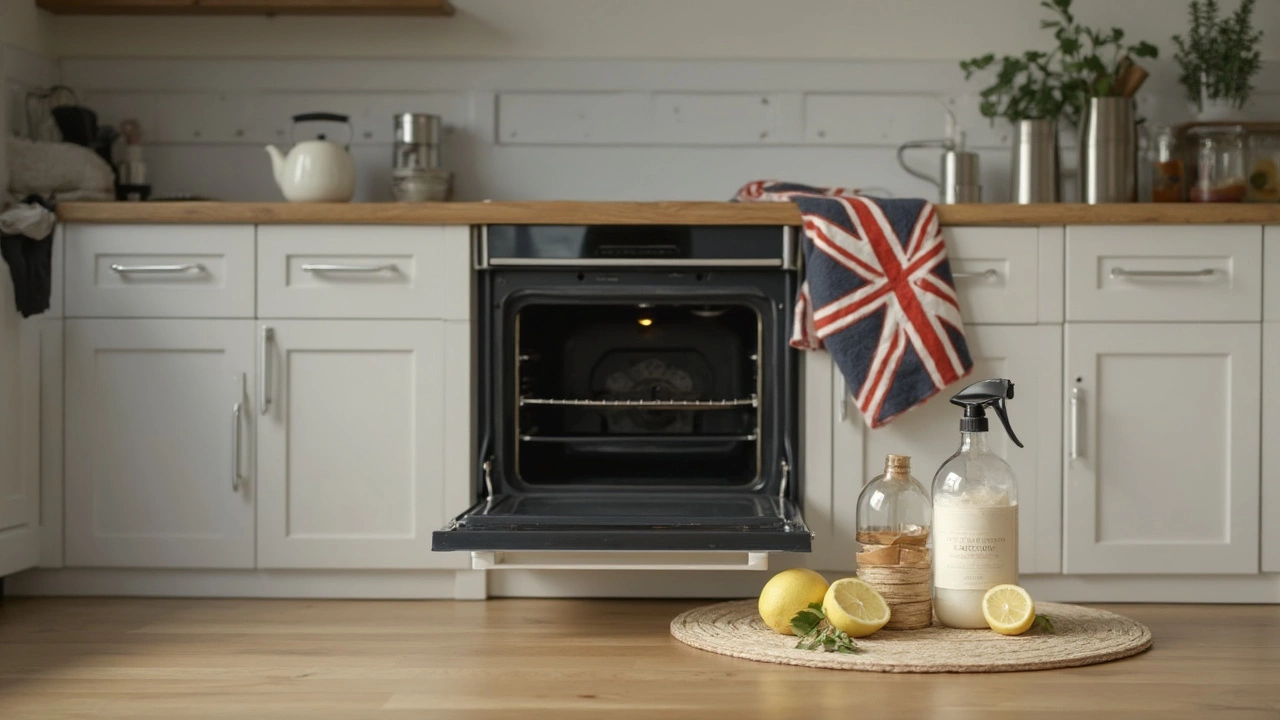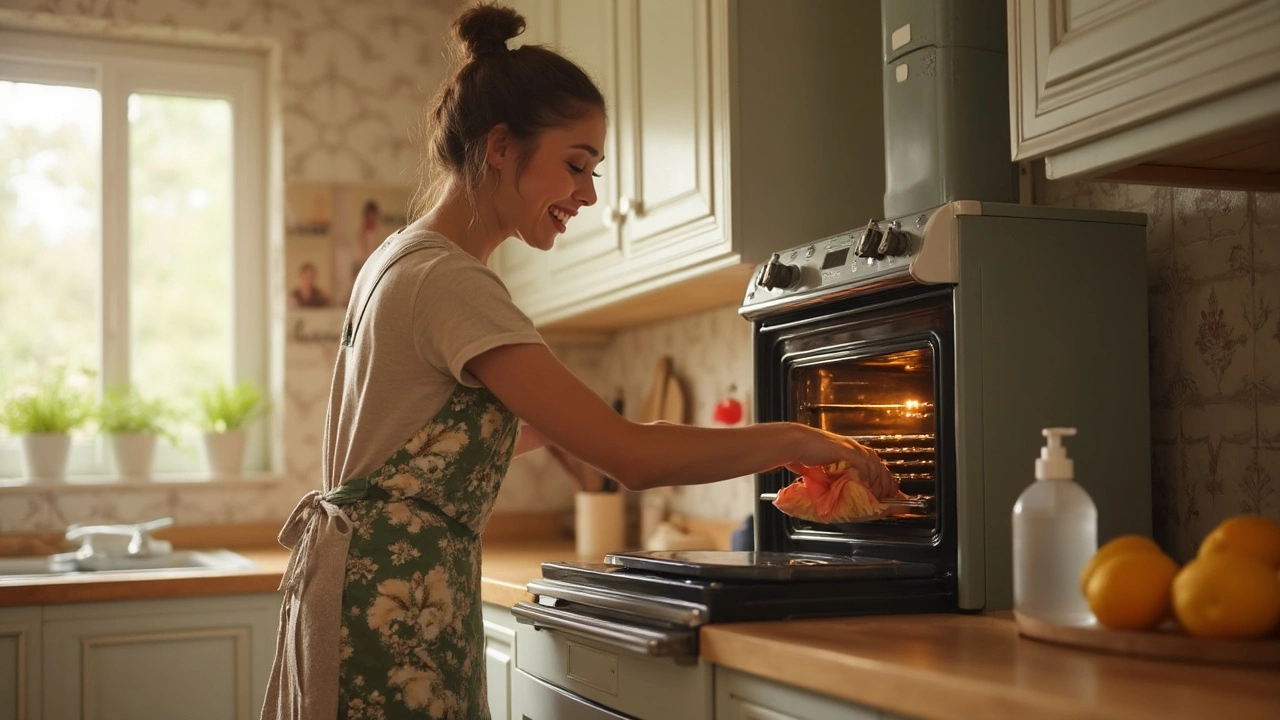Trying to clean your oven’s interior? But there's no baking soda to be found in your pantry? Don't worry, there are plenty of other options that work just as well. While baking soda is a star for some, you can swap it out and still get that oven shining.
First up, let's talk about why vinegar is a favorite in many households. Vinegar, especially when mixed with a bit of water, is an excellent degreaser. It works on grime and is gentle on the environment. Got a spray bottle? Perfect, fill it with a mix of equal parts water and vinegar, spritz it everywhere inside the oven, and let it sit for a little while.
No vinegar? Grab a lemon or two. Lemons are nature's scrubbers, and they smell great too. Squeeze some lemon juice into a bowl of water, place it in the oven, and heat until it boils. The steam loosens the grime, making it easier to wipe away. Plus, it leaves the kitchen smelling all citrusy fresh.
Why Skip Baking Soda?
Now, while baking soda is often hailed as the miracle cleaner, sometimes it's not the right fit for everyone. Maybe you ran out, or perhaps you're dealing with stubborn grime that needs something a bit stronger. Not everyone knows that baking soda has a slight abrasiveness, which can be a concern if you have a fancy oven with a coating you don’t want to scratch.
In some cases, people also find that a baking soda paste can be a hassle to apply and remove. It can dry too hard, making it challenging to scrub off. There's also the concern about baking soda leaving behind a residue if not completely rinsed, which isn’t ideal if you’re sensitive to it or just don't have the time.
Exploring Alternatives
Many folks are leaning towards more liquid-based cleaners, like vinegar and lemon juice, which tend to spread more easily and don't leave any residue. Speaking of alternatives, did you know that a blend of vinegar can often be as effective, if not more, when it comes to breaking down grease?
Environmental Concerns
If minimizing environmental impact is on your checklist, reducing baking powder use might be beneficial. Although entirely natural, frequent use of baking powder in substantial amounts can have a slight effect on the alkalinity of your home wastewater.
A small trivia for numbers fans – a 2022 survey found 38% of people choosing baking soda alternatives only because of convenience and ease of use. It’s pretty wild how just a little change in habit can save a bunch of time and effort, right?
So, while baking soda still works wonders, sometimes exploring other ingredients in your kitchen can bring similar or even superior results. Plus, switching things up might just give you a fresh outlook on cleaning.
Essential Supplies
When it comes to cleaning the inside of your oven without using baking soda, you'll need a few basic supplies. These items are probably hanging around your kitchen already. Let's break it down.
Basic Cleaning Supplies
- Vinegar: Known for its acidic nature, vinegar works wonders in cutting through grease and grime efficiently. It's non-toxic and safe to use—perfect for oven cleaning.
- Lemons: These citrus fruits aren't just for lemonade. The natural acidity and fresh scent make them excellent for not only cleaning but also deodorizing.
- Dish Soap: A staple for breaking down grease, adding a few drops to your cleansing mix can increase the cleaning power exponentially.
- Microfiber Cloths or Sponges: These are gentle and effective for scrubbing without scratching the surfaces. A must-have for any cleaning task.
- Spray Bottle: Handy for mixing and easily applying your homemade cleaning solutions.
Additional Items
If you've got stubborn spots, you may need a few extras. Scrub brushes or old toothbrushes can get into nooks and crannies. And don't forget protective gloves to keep your hands safe while dealing with the tasks.
| Item | Purpose |
|---|---|
| Vinegar | Degreaser and disinfectant |
| Lemons | Natural cleaner and deodorizer |
| Spray Bottle | Application of solutions |
By arming yourself with these essential supplies, you're set to tackle any mess inside your oven without needing a sprinkle of baking soda. Happy cleaning!

Vinegar Wonders
Vinegar is like the superhero of household cleaners—always ready to swoop in and save the day, especially for your oven cleaning. It’s effective, affordable, and most importantly, eco-friendly. What's not to love?
White vinegar, the trusty sidekick in this cleaning adventure, has all the right stuff to tackle grease and grime. Here's the lowdown on how to use it. First, mix equal parts vinegar and water in a spray bottle. This simple concoction is your secret weapon.
Step-by-Step Cleaning with Vinegar
- Start by removing any loose crumbs from the oven. A simple brush or vacuum does the trick.
- Spray the vinegar solution generously all over the oven’s insides. Pay extra attention to those stubborn spots where gunk tends to hang out.
- Let it sit for about 15-20 minutes. This gives vinegar time to break down the grime.
- Grab a microfiber cloth or sponge and start wiping. You’ll see the dirt lift off with ease.
- If there are some tough areas, don't stress. Spray again and give it a quick scrub. Repeat if necessary.
And voilà! Your oven will be sparkling without the use of baking soda. Some folks also like to add a few drops of dish soap to their vinegar mixture for an extra cleaning punch—totally up to you.
A quick pro tip: Always keep the kitchen well-ventilated while cleaning with vinegar. It’s safe but has a strong smell that can hang around if there's no airflow.
Lately, word on the street is that nearly 70% of homes already keep vinegar on hand as a household cleaner. So why not join the trend and make your oven squeaky clean?
Lemon Power
When you think about cleaning your oven, it might seem strange to reach for a few lemons. But trust me, lemons are like little miracle workers for cleaning tasks, and they pack a punch, especially when you're out of baking soda.
Here's the scoop: Lemons are naturally high in citric acid, which is a great fighter against grease and grime. Plus, they have antibacterial properties. Not only will they clean, but they’ll leave your oven smelling amazing.
Step-by-Step Instructions
- First, grab two or three lemons from your kitchen.
- Cut them in half and squeeze the juice into an oven-safe bowl. You want at least half a cup of lemon juice.
- Fill the same bowl with some water, about halfway full.
- Place the bowl in your oven and heat it at 250°F for about 30 minutes. The lemon and water mix will create steam.
- After 30 minutes, carefully remove the bowl (it’ll be hot!) and wipe down the inside of your oven. The steam will have loosened the gunk, making it easy to clean away.
And just like that, your oven is free from grease, and your kitchen smells fantastic. Using lemon as an oven cleaner is a win-win: effective and naturally fragrant!

Preventive Maintenance
Keeping your oven clean takes some work, but regular upkeep prevents grime and grease build-up, saving you a bigger headache later on. Let's talk about simple habits that can make a world of difference.
Regular Wipe Downs
After every cooking session, allow your oven to cool down and then give the interior a quick wipe with a damp cloth. This routine practice, though small, does wonders to stop grease from hardening. It’s like brushing your teeth—quick and essential.
Use Oven Liners
Oven liners are a lifesaver. These nifty sheets sit at the bottom of your oven catching all those drips and splatters. Once they look grimy, just take them out, wash them, and pop them back. It’s a simple yet effective trick for maintaining a clean oven.
Spill-Proof Cooking
Pro tip: whenever cooking something juicy or saucy, place a baking sheet under your dish. It catches any overflows, keeping your oven bottom from transforming into a battleground of baked-on residue.
Regular Check-ups
Add a reminder on your calendar to do a bi-weekly inspection. Look for any major spills or residue. If it looks like it needs attention, tackle it immediately rather than letting it bake on.
| Task | Frequency |
|---|---|
| Quick Wipe Down | After each use |
| Check Liners | Monthly |
| Full Cleaning | Bi-Monthly |
This table can help you stay on track with your oven maintenance. Remember, a little effort now saves a lot of scrubbing later. Implement these habits, and your oven stays clean without too much fuss!
